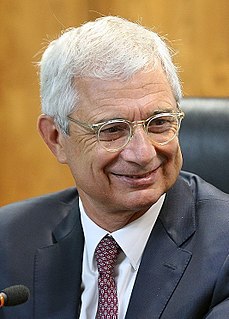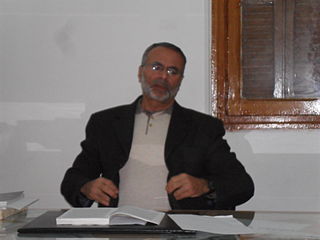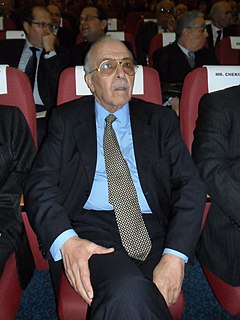
The Constitution of Tunisia is the supreme law of the Tunisian Republic. The constitution is the framework for the organization of the Tunisian government and for the relationship of the federal government with the governorates, citizens, and all people within Tunisia. Tunisia's first modern constitution was the Fundamental Pact of 1857. This was followed by the Constitution of 1861, which was not replaced until after the departure of French administrators in 1956, by the constitution of 1959. It was adopted on 1 June 1959 and amended in 1999 and 2002, after the Tunisian constitutional referendum of 2002.

Claude Bartolone is a Tunisian-born French politician who was President of the National Assembly of France from 2012 to 2017. A member of the Socialist Party, he was first elected to the National Assembly, representing the Seine-Saint-Denis department, in 1981. He served in the government as Delegate Minister for the City from 1998 to 2002, and he was President of the Seine-Saint-Denis General Council from 2008 to 2012.

Presidential elections were held in Tunisia on 23 November 2014, a month after parliamentary elections. They were the first free and fair presidential elections since the country gained independence in 1956, and the first direct presidential elections after the Tunisian Revolution of 2011 and the adoption of a new Constitution in January 2014.

Mustapha Ben Jafar is a Tunisian politician and medical doctor who was Speaker of the Constituent Assembly of Tunisia from November 2011 to December 2014. He founded and has led the Democratic Forum for Labour and Liberties (FDTL), a political party, since 1994.

The Democratic Forum for Labour and Liberties, also referred to as Ettakatol or by its French acronym FDTL, is a social democratic political party in Tunisia. It was founded on 9 April 1994 and officially recognized on 25 October 2002. Its founder and Secretary-General is the radiologist Mustapha Ben Jafar.

Mohamed Moncef Marzouki is a Tunisian politician who was President of Tunisia from 2011 to 2014. Through his career he has been a human rights activist, physician and politician. On 12 December 2011, he was elected as President of Tunisia by the Constituent Assembly.

The Congress for the Republic, also referred to as El Mottamar or by its French acronym CPR, is a centre-left secular political party in Tunisia. It was created in 2001, but legalised only after the 2011 Tunisian revolution. Its most prominent founder and long-term leader was Moncef Marzouki. He had been the party's honorary president since he became interim President of Tunisia in December 2011.

The Ennahda Movement, also known as Renaissance Party or simply Ennahda, is a self-defined "Muslim democratic" political party in Tunisia. Founded as "The Movement of Islamic Tendency" in 1981, Ennahda was inspired by the Abul A'la Maududi, and Egyptian Muslim Brotherhood, it has also been called by Robert F. Worth "the mildest and most democratic Islamist party in history". Rached Ghannouchi is the movement's founder and has remained its president for 38 years without interruption.
The Democratic Modernist Pole (PDM) was a Tunisian political coalition created for the Tunisian Constituent Assembly election of 23 October 2011. The "Pole" consisted of four parties and five citizen initiatives, the largest of which is the Ettajdid Movement. However, an 18 October report by Bloomberg.com states that "attempts by ... the Modernist Democratic Pole, to create a pre-election multiparty coalition failed."

The Constituent Assembly of Tunisia, or National Constituent Assembly (NCA) was the body in charge of devising a new Tunisian constitution for the era after the fall of President Zine El Abidine Ben Ali and his Constitutional Democratic Rally (RCD)–regime. Convoked after the election on 23 October 2011, the convention consists of 217 lawmakers representing Tunisians living both in the country and abroad. A plurality of members comes from the moderate Islamist Ennahda Movement. The Assembly held its first meeting on 22 November 2011, and was dissolved and replaced by the Assembly of the Representatives of the People on 26 October 2014.

The Current of Love or Tayar el-Mahaba, before May 2013 known as the Popular Petition for Freedom, Justice and Development, short Popular Petition, Aridha Chaabia or Al Aridha, is a political movement and electoral list in Tunisia. It was formed after the Tunisian revolution, on 17 March 2011. It has been founded and led by the political writer and media entrepreneur Mohamed Hechmi Hamdi. It is closely linked to the Party of Progressive Conservatives which has been officially registered as a political party.

Abderraouf Ayadi is a Tunisian human rights activist, politician and lawyer.

The People's Movement is a political party in Tunisia. It is a socialist, secularist and Arab nationalist party founded in April 2011. The composition of the party has changed several times as a result of mergers and splits. Between 2013 and 2014, the People's Movement was a member of the Popular Front coalition, one of the three main coalitions of political parties in Tunisia. The former leader of the party, Mohamed Brahmi, was assassinated on 25 July 2013 by unknown killers.

Lotfi Ben Jeddou is a Tunisian magistrate who was Minister of the Interior from 14 March 2013 to 6 February 2015. Following the resignation of former Prime Minister Hamadi Jebali, Ali Larayedh was designated as his successor on 8 March 2013 and named his government with Othman Jerandi as foreign minister, Rachid Sabbagh as defense minister, and Lotfi Ben Jeddou as Minister of the Interior. The government was approved by the Constituent Assembly (139–45) on 13 March 2013 and took office on 14 March 2013. He is a member of the Ennahda Movement.

Parliamentary elections were held in Tunisia on 26 October 2014. Campaigning started on 4 October 2014. They were the first free regular legislative elections since independence in 1956, and the first elections held following the adoption of the new constitution in January 2014, which created a 217-seat Assembly of the Representatives of the People. According to preliminary results, Nidaa Tounes gained a plurality of votes, winning 85 seats in the 217-seat parliament, beating the Ennahda Movement and many smaller parties.

Mezri Haddad is a Tunisian journalist, writer, philosopher and diplomat. Haddad was a doctor of moral and political philosophy at the Paris-Sorbonne University, and the first Muslim candidate to be qualified by the National Council of French universities as a lecturer in Catholic theology. He is the author of several essays that focus on politics and religion.

Liberalism in Tunisia or Tunisian Liberalism is a school of political ideology that encompasses various political parties in the country.

Bochra Belhaj Hmida, was born at Zaghouan. She is a Tunisian lawyer and politician.
Events in the year 2021 in Tunisia.

Chedly Ayari was a Tunisian politician, economist, and diplomat. He served in several ministerial positions under the government of Habib Bourguiba and was President of the Central Bank of Tunisia from 24 July 2012 to 16 February 2018.
















